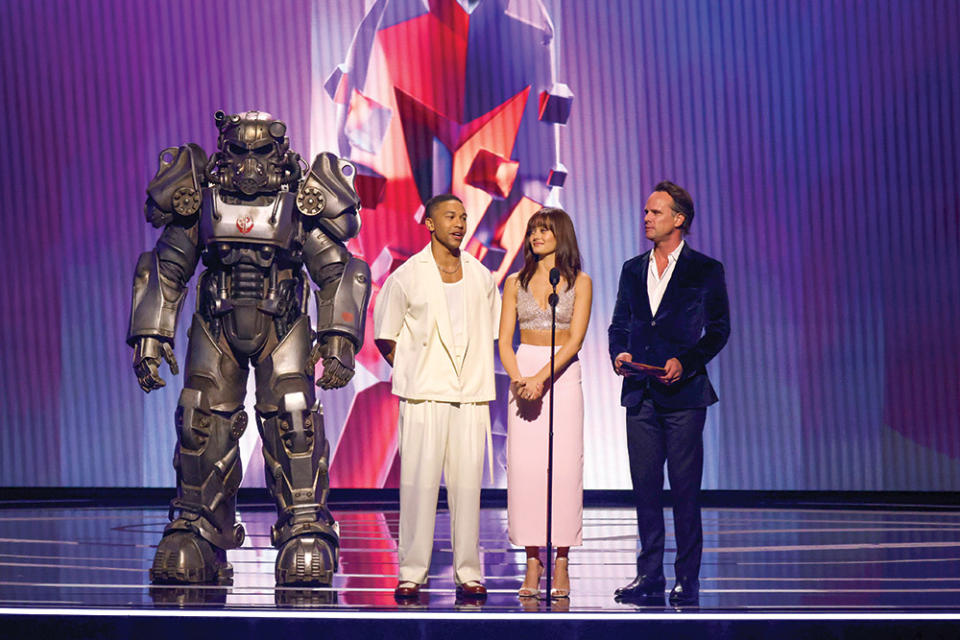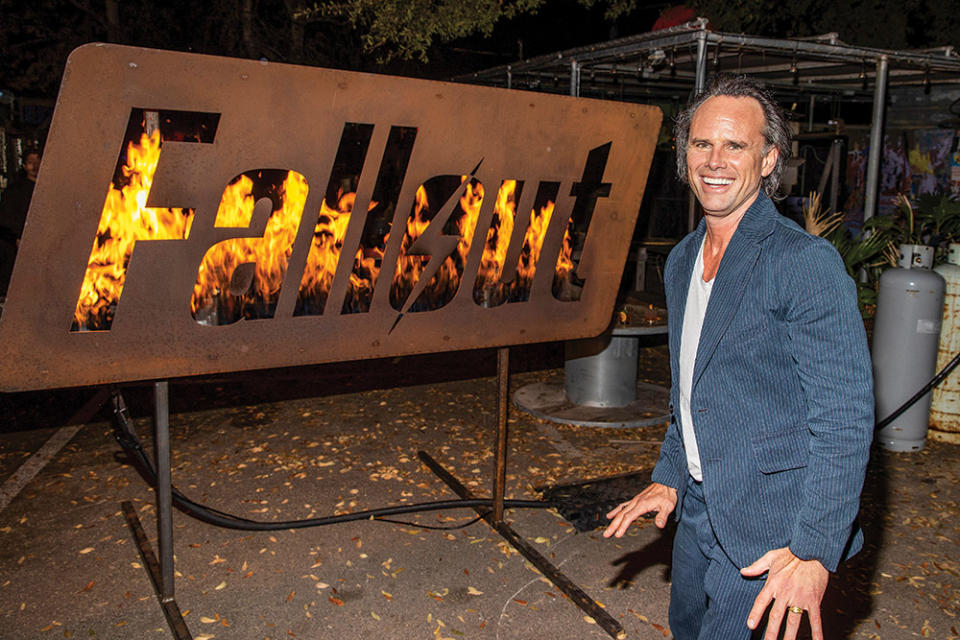‘Fallout’ Star Walton Goggins on Bringing Swagger to the Gunslinging Ghoul
- Oops!Something went wrong.Please try again later.

Walton Goggins has played gunslingers before. He’s been a renegade sheriff in The Hateful Eight, an outlaw on Justified, a Navy SEAL on Six and a trigger-happy train robber in Shanghai Noon — but Fallout marks the first time he’s been two versions of one cowboy.
In Prime Video’s adaptation of the popular video game franchise, Goggins portrays Cooper Howard, a Hollywood Western has-been making ends meet as the lasso-spinning entertainment at kids’ parties. He’s also The Ghoul, a radioactive bounty hunter hardened by two centuries of wandering in a post-nuclear hellscape.
More from The Hollywood Reporter
Hollywood Flashback: Karen Arthur Broke the Directors' Glass Ceiling
Calista Flockhart on Dealing With Sudden 'Ally McBeal' Fame: "I Stopped Leaving My House"
Set in 23rd century dystopian L.A. some 220 years after an atomic bomb decimated the U.S., the first season follows Lucy MacLean (Ella Purnell), an intrepid vault dweller who leaves her underground community in search of her kidnapped father (Kyle MacLachlan). Along the way, she meets The Ghoul and a soldier named Maximus (Aaron Moten). The show has been renewed for a second season.
“It’s been a hell of a journey,” Goggins, 52, tells THR. “I knew it was going to be special just being given the opportunity to play these two different people. I didn’t know it was going to resonate so deeply with me or fans of the game.”
How did the role come to you? Have you played the game?
It was a conscious decision not to play it. I knew we were meeting with executive producer Jonathan Nolan, and I was just so excited. In anticipation of this meeting, I came across a description of a male avatar. I only read a few sentences and thought, “He’s a hero, he’s a cool guy leaving a vault going out into the world. That must be what they’re going to talk to me about!” [Nolan] wanted me to be surprised going into it. Lo and behold, five minutes into the conversation, after I said yes, [he and showrunners Geneva Robertson-Dworet and Graham Wagner] told me, “You should know he’s an irradiated bounty hunter who’s been walking in a postapocalyptic world for 200 years, and he doesn’t have a nose.” I found out when I read the scripts that it’s two characters. It’s the same person at two very different times in their life.
How was it stepping into the role of Cooper?
I wasn’t expecting how deeply emotionally impacted I was reading his story, starting with the opening of this entire show and the dropping of those bombs. It was a very visceral experience on the page.
The series also adopts the game’s sense of humor.
The humor is baked into the DNA of the Fallout world, and I didn’t know that. But the pilot and the first three scripts that were written by Geneva and Graham had nailed that tone. It was impossible not to understand the story that we were telling.
The show also avoids the game’s campiness, and you don’t lean too much into caricatures of Hollywood cowboys, either. Was that a conscious thing?
I don’t believe in playing a character, I don’t believe in making choices. It’s just a matter of you as a storyteller being truthful and honest in — not even interpretation — but your inhabiting of their spirit. It’s a very spiritual experience. I’m not just an actor who plays these characters and I show up and I say my lines. I knew that [Cooper and The Ghoul] needed to speak to each other over time, but I didn’t lean into or stay away from stereotypes, because these are not stereotypical people.

As we’re watching the show, we’re asking, “What did The Ghoul lose?” But then the question turns into, “What is he looking for?” What questions were you asking in playing these characters?
I really had to understand who he was in terms of it being applicable to a time and a place that I’m familiar with, at least through movies. While the timeline is different, the past — the world before the bombs dropped — is a retro-futuristic Pax Americana full of potential experiences where we are the leaders and the arbiters of culture and cinema and all the music and all the rest of it.
Cooper is real to me. I believe that I could find him in Los Angeles if I were here 50, 60 years ago. Who were his contemporaries, the people that he was up against, who he lost jobs to? Where was he on the pecking order? He wasn’t John Wayne, but there might be a version of his experience where he was Alan Ladd, certainly James Arness. I watched a lot of existing interviews that I could find of eight different actors, including Jimmy Stewart and Henry Fonda. [Postwar Hollywood] was an elegant time — the people that had these houses, these parties, that social life — and there was also a bit of McCarthyism.
Cooper isn’t the best actor in the world, but he does have charm and charisma. He does have an elegance about him the way that these people did at that time, even if they were not from Hollywood or an urban city in America. He’s a stuntman from a rural part of America who got a walk-on part because the director was hanging out with him at craft services. That led to another role, which led to five other roles. And the roles kept getting bigger, which led to a career. That’s happened many times in Hollywood.
And then I did the same thing for The Ghoul. I settled on Fonda and Once Upon a Time in the West and his ruthless aspect — no wasted effort whatsoever — crossed with Paul Newman in Butch Cassidy and the Sundance Kid; he’s a rascal. Cooper and The Ghoul are the same person. What are the things they have in common? It’s their sense of humor, their swagger and a reasonable, practical approach to life. Maybe that was enough to hold that thread between them. I certainly felt like the same person playing them. It’s just that The Ghoul had lost everything that we set up at the beginning of this story. He had seen the worst that humanity had to offer over the course of 200 years of walking a nuclear postapocalyptic wasteland.
What I hope people are now excited about is the time between this revelation and this kid’s birthday party. [The first season is] reverse-engineered, and what happens in between then? Are [Cooper and his wife, Barb, played by Frances Turner] divorced? Is this shared custody? I have an idea of what they are. I won’t say it, but it’s nuanced and complicated.
Most of your scenes as The Ghoul are with Purnell. How did you two approach their relationship?
I don’t really believe in working on a relationship; that’s not my approach to storytelling. In fact, one of my favorite lines in this entire script is delivered by Aaron when he says, “Everybody wants to save the world. They just disagree on how to do it.”
The same thing is applicable to one’s approach to storytelling. Ella is such a wonderful actor and a very present, curious person who wants to understand how everything fits in the history of everything, and that serves her process. I enjoyed that collaboration. But for myself, I don’t need anything. I have it in my head.
It’s great to see The Ghoul and Lucy’s relationship evolve. They seem to get off on the wrong foot, and that completely changes by the end of the first season.
The Ghoul on paper seemed sadistic and seemed like, “Why is he torturing this person?” He never tortured her, ever. He’s not Machiavellian or sadistic in that way. She is just another encounter on an average day in his life. He just so happens to have a conversation with her because there’s nothing else to do while he’s using her as bait. There is no glee, he’s just not getting anything from being mean to her. He doesn’t think he’s being mean to her. Life, the way we understand it morally for The Ghoul, is very different from the life of Lucy and the vault dwellers. They have all of their needs met, whereas the rest of us on the surface had nothing, and we were left to die. I just so loved working with Ella because of her naiveté as Lucy. Once The Ghoul zeroed in on her and looked at her because he needed her, he realized she was a person and understood her, and through his cynicism, wanted to teach her a lesson.

How much time did you have in between filming Fallout and The White Lotus, and what can you share about the latter character?
We finished Fallout [season one] in February of 2023. Two months later, the strike happened. It was such a tumultuous time for everyone in this business, as if the business itself was going through an existential crisis. And so I had this time with my child, which is the most important thing for me. And then we started The White Lotus in early February [2024], and now it’ll be another run, so I won’t have much time off until maybe summer of next year. I can’t tell you a lot about The White Lotus other than we’re hotel guests checking into a hotel. Mike White is a brilliant writer and director, and I can tell you that we are deep into this experience and it’s really fucking good.
This story first appeared in the June 12 issue of The Hollywood Reporter magazine. Click here to subscribe.
A previous version of this story misidentified Howard Cooper’s wife as Betty, played by Leslie Uggams. Cooper’s wife in the show is Barb, played by Frances Turner.
Best of The Hollywood Reporter

